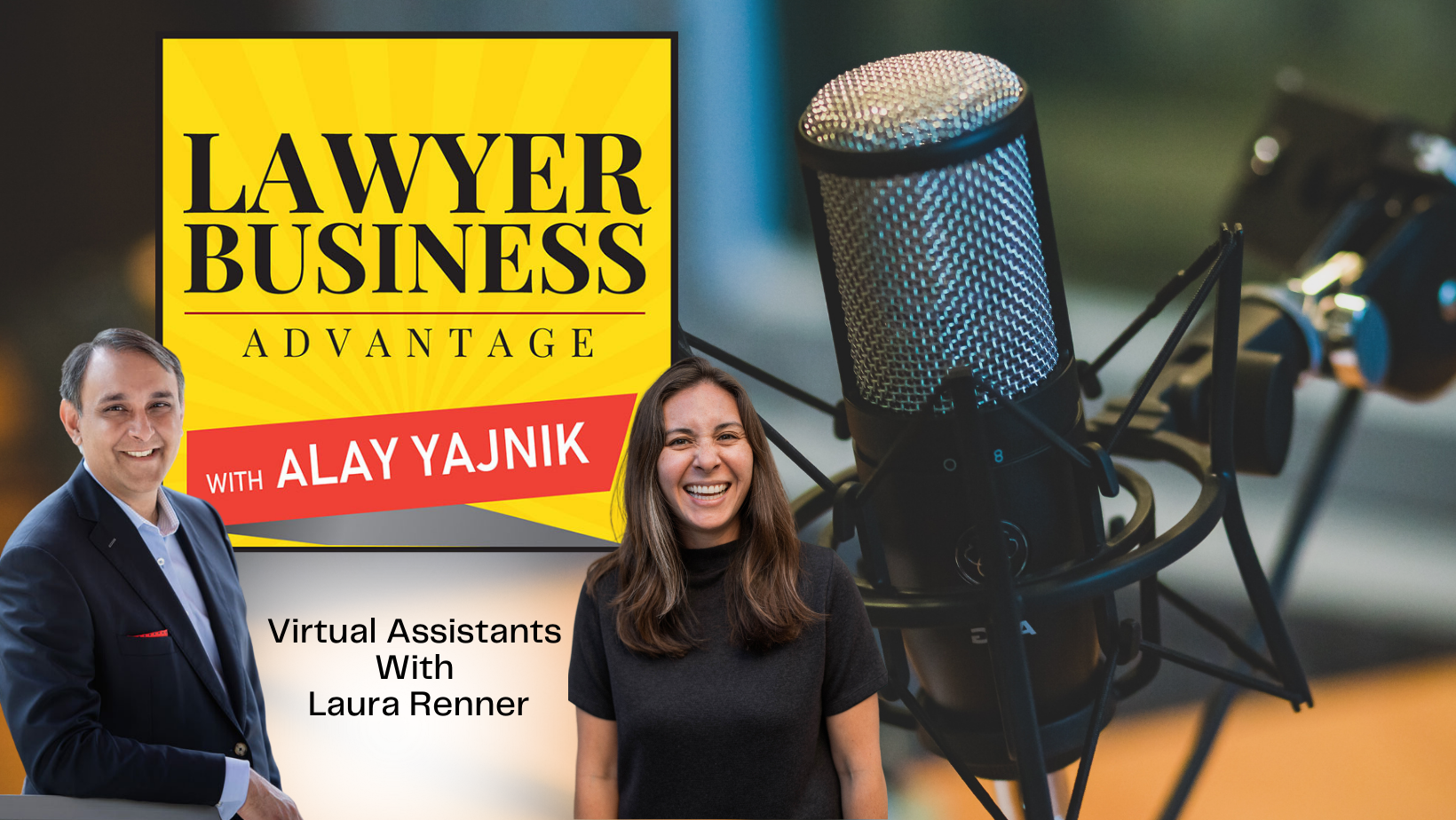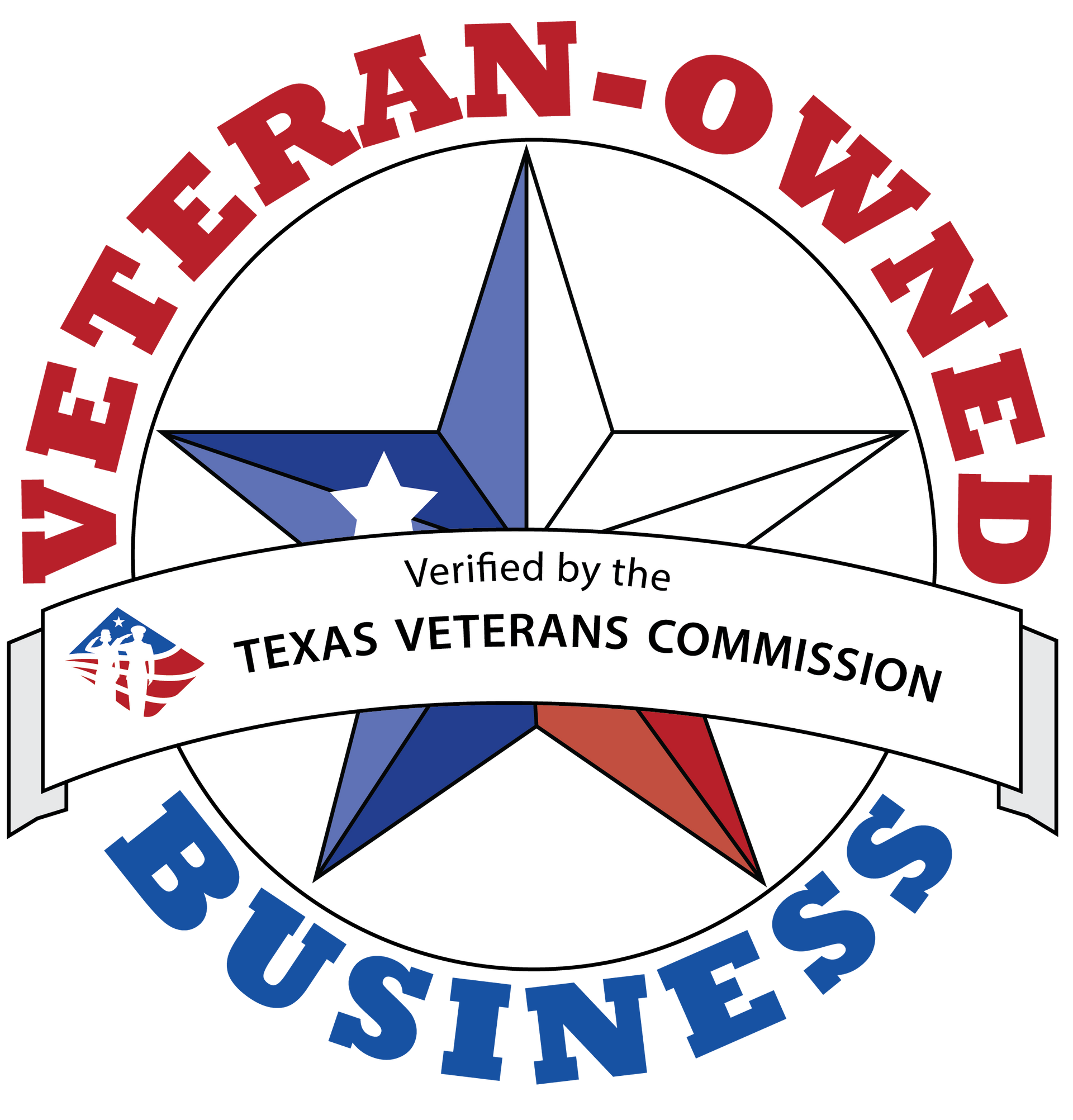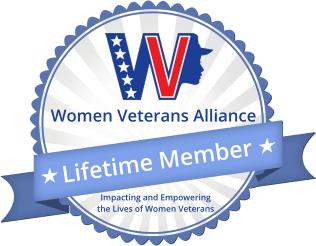Virtual Assistants for Lawyers: Expert Tips on Delegation and Growth - Lawyers Business Advantage Podcast

Listen in as Laura speaks with Alay Yajnik, one of the founding partners at Law Firm Success Group, a coaching firm, dedicated to helping attorney earn more money, get better clients and spend more time with family. Alay also hosts the Lawyer's Business Advantage Podcast. He and Laura discussed the value a virtual assistant can bring to a law practice, about the importance of setting expectations and establishing great communication channels. They also discussed the specifics of delegating to a virtual assistant in order to ensure productivity and efficiency. Take a listen below:
WELCOME TO LAWYER BUSINESS ADVANTAGE. THIS PODCAST IS DEDICATED TO HELPING ATTORNEYS EARN MORE MONEY, GET BETTER CLIENTS, AND SPEND MORE TIME WITH FAMILY. I'M YOUR HOST ALI YAJNIK, FOUNDER OF LAW FIRM SUCCESS GROUP. SMART BUSINESS GUIDANCE FOR SMALL LAW FIRMS BEGINS IN THREE, TWO, ONE.
ALAY:
And it's my pleasure to have on Lawyer Business Advantage my friend and colleague, Laura Renner, president and founder of Freedom Makers Virtual Services. Laura! Welcome to lawyer business advantage… Finally!
LAURA:
Yes, thanks, Alay! I'm happy to be here.
ALAY:
So I've got a question for you. When it comes to virtual services and attorneys, what is the number one thing that attorneys should be thinking about as they explore virtual services of all kinds?
LAURA:
The number one thing they should be thinking about is: what are their strengths, what gives them energy, and therefore what should they look at delegating first, if that makes sense.
ALAY:
Give me an example.
LAURA:
So an example is especially with sort of solo practicing attorneys, right? You're balancing running a business and practicing law. And presumably, most people enjoy practicing law more than running a business, right? And so then if that's the case, then they probably don't like the client intake process or there might be certain parts of it they don't like, maybe scheduling the first meeting, that kind of thing. So that's what it's like. Okay. That part is what always slows me down or what trips me up. So that's the part I'm going to delegate first. And so that helps not only grow their practice, but also… I call it energy management instead of time management because it might only take 30 seconds, but if it totally drains you or makes you put off doing anything else, then it's taking longer than that because it's costing you energy. So that's why I say think about things around what drains your energy and get rid of, or delegate
those things first.
ALAY:
I love that. I expect some of our audiences thinking, “that sounds like my clients, they drain my energy!” If that's you and you're listening to this, don't worry, I've got a whole other segment on that that we can cover. But virtual services means different things to different people. And what does it mean to you in the context of Freedom Makers?
LAURA:
Yes. So we are by definition a virtual assistant agency, but we do so much more than that. So that's why we refer to ourselves as virtual services. But other people might think that's a tech platform or they might think that's various different things. But for us, we are virtual assistants plus! Virtual assistants and more.
ALAY:
Well, tell me about the more.
LAURA:
More well, so we hire military spouses to do the virtual assistant and they come with a wide variety of skills. So while they are doing administrative work and being an assistant in that regard, we have ones that are helping coordinate projects, even managing projects, or they really become collaborative partners with our clients and just especially the solo business, right? You're wearing all the hats, you're marketing it, finance, operations, customer service. And so then when the Freedom Maker joins the team, then they become either they start wearing some of those hats or they help you wearing those hats. And so they become more of a collaborative partner than quote unquote, just an assistant, if that makes sense.
ALAY:
It does, and we're going to dig into that more. First of all, I want to thank you for your service to our country. Deeply appreciated. And I know you have a deep connection to Freedom Makers because of that. Tell us a little bit about how you started Freedom Makers and why.
LAURA:
Yeah, so I was originally doing recruiting for small businesses, and I was meeting a lot of business owners who weren't ready to hire or weren't ready to commit even with a part-time employee, partially because maybe their revenue wasn't consistent or predictable enough or they just didn't have enough work for even part-time. They just needed something super part-time. Meanwhile, I had been out of the military at that point for about maybe seven or eight years, but my brother was still in, and I was seeing my sister-in-law go through trying to find work every time they moved. I watched my mom go through that. We grew up as a military family, and even coworkers’ spouses go through that when I was in. And I just saw that there's this untapped source of talent on the military spouse side and this unmet need, especially in the solopreneur side. And I just thought, let's do it, let's go for it! And so that's what led me to start it.
ALAY:
Love that. And there's a huge potential, I think, in the law firm space. And I know you work with a lot of law firms. What are some of the traditional law firm roles that the Freedom Makers fill for firms?
LAURA:
I think a big one is client intake systematizing. That and then making that run more smoothly. The example I like to give is like, if you think about contracts… it is almost like your kitchen cupboard. And let's say every time you empty the dishwasher, you put the bowls in a different place. And it's sort of like if you don't have a template for your contract and you just go to your email and find the last client that you send a contract to, that kind of thing. So when you have It systematized, you are able to have someone else take care of it for you, especially if you have things that you get from every client! So every client fills out a certain form or they have a certain appointment that they make with you, all that can be systematized and handed off to a virtual assistant. And so we see that a lot, in fact. And we know that Clio is a popular tool. So we're always looking for military spouses that have Clio experience because that's a big part of client intake and just managing the client from an admin side. And then, if the attorney is using social media, they will oftentimes ask their Freedom Maker to help with the consistency of posting and even sometimes curating or creating content for that.
Sometimes too, they will have the Freedom Makers help with email and calendar management, particularly a solopreneur where you might have leads coming into your email, and you just don't have time to track at all. So then you might have your Freedom Maker sort of organize your email for you so you can get to those leads a little bit faster.
ALAY:
Awesome. So client intake, social media and then leads management through email and calendar, those consultations.
LAURA:
Exactly.
ALAY:
Awesome. And one of the challenges that my clients run into a lot when they're looking at bringing in an outsourced service provider is they don't have the process in place. So if they go hire a virtual assistant, they've got to then spend all this time trying to figure out the process and train the virtual assistant on the process, and it turns out to be a big headache. How do you overcome that in your work with law firms?
LAURA:
Well, even a little bit before that we offer a task audit that could just help them determine what to delegate. But during the sort of onboarding process we're asking them what do you have in mind for what you'd like your Freedom Maker to do? And we're looking for even if they don't have a process built, if they at least have it in mind, then they can have their Freedom Maker build it for them or document it for them. But if they can't even pause to create something, just think about it, then we know they're probably never going to get off the ground with their Freedom Maker. So that's one of the things we actually look for is even if you don't have it built, if you just have what you think it would look like, then oftentimes they work with their Freedom Maker to capture that and then to go build it for them.
ALAY:
So I think that's a really important distinction and hopefully you attorney entrepreneurs that are listening will pick up on this. To actually have the virtual assistant service and the virtual assistant collaborate with you to take the heavy lifting off of your shoulders to build your process for you and document it for you is a huge value adds. So that's fantastic Laura, that you all provide that. You mentioned something that I want to dig into a little bit. You mentioned something about a task audit or something like that.
LAURA:
Yeah, we're a small business too, so we use small business tools and it's on Jotform but you can click different sort of functions like marketing or operations where you're like, “these are the things I'm thinking about delegating.” And then when you do that it opens up with some common solopreneur task. And then you choose, “only I can do this,” “someone else can definitely do this.” Or, “it could go either way.” And it just helps trigger ideas for people in what they could delegate or what definitely needs to stay in their bucket, if you will.
ALAY:
Got it. Awesome. And so now we're going to move to the other side of the coin. We've talked a lot about how they can actually take advantage of these virtual services. Let's talk about maybe some situations where virtual services aren't a good fit because it's really important for clients to know that. So what are some situations where you would not recommend the client actually hire a virtual assistant?
LAURA:
Great question. I think there are a couple of things. One, maybe not for attorneys… but in businesses in general. Where they sometimes think they can delegate sales and because in their mind, if they only pay if the sales closes, then it's a win-win for them. What I have seen, though, is when they do that, no one can sell as good as they can. Right. And especially an attorney where you're selling your expertise, right? So we don't necessarily do that in our firm, but also just in general for using it for sales. I'm not talking about lead generation, but just actually closing the stage.
ALAY:
That consultation.
LAURA:
Exactly. I don't recommend that. The other piece for us at least is anything that's sort of live-based, such as answering a phone. For us, we charge by the hour. It's not really cost-efficient. There are answering services that charge by the minute or by the call. That's a better fit. And then finally, some law may need to be done in person. Right? Some can be done virtually. But if you're thinking about things that would be handled by an associate attorney that you wouldn't want to delegate. I also see that sometimes they're wanting to delegate paralegal work to a virtual assistant, which you really want to make sure you're relying on someone with that expertise, a paralegal expertise. So yeah, so it's more like seeing what's appropriate for a virtual assistant level versus a paralegal and then versus in person. I mean, I'm the owner of a virtual firm. I believe most things can be done virtually in the services space. So it really depends on the clients you serve and what you're willing to do virtually in that regard. But as far as what you can outsource or delegate, you want to delegate what gives you that most impact. For example, consultation is probably not a good thing to delegate unless it's to an associate attorney who's been with you a long time, that kind of thing, right?
ALAY:
And even then, maybe not.
LAURA:
Right?
ALAY:
Yeah, those are great tips. Thanks for sharing that. And you mentioned another great word which I want to dig into, which is delegation. Attorneys generally haven't been trained in the management techniques of people. A lot of them are just naturally talented at it, and they're just able to do it. Many are not. And so oftentimes, a virtual relationship may not work out because the attorney is not great at delegating. So how do you address that issue?
LAURA:
Yes. So tactically, right off the bat, I always recommend have a regularly scheduled meeting with whoever's working with you virtually. Whether that's weekly, I would suggest at least weekly so that you're able to keep base with them and touch base, that kind of thing. The other thing, particularly for firms that might be in a hybrid environment, where you have people in the office as well as virtual have a single source of truth that is online. You run that risk of if you make a decision in the hallway talking to someone and that doesn't get shared company-wide, then the people who are working virtually miss out on that decision. And then that impacts culture, that impacts the way the firm can move forward when half the team knows something and the other half does it. So you want to make sure that you're deliberate about having that single source of truth. But when it comes to delegation, whether it's in person or virtual, I love recommending the five levels of delegation. And they can vary by task or responsibility. And it's just really a question of how much control you want to have.
So level one is: do exactly what I said, how I said to do it, when I said to do it, don't do anything outside of that. Right. And level five is: I trust you completely, don't even update me, just take care of it. And then kind of in between. Level two might be go do the research and share with me what you found, and then I will make a decision and tell you what to do next. Level three might be do that research, make a recommendation, but I still decide and we'll tell you what to do next. And level four is do the research, make a decision, tell me what you did right. And it can vary. It could be: this task, I want level one, that task, I want level five. And then that can help you determine who to hire as well as how much you're willing to let go or how much sort of wiggle room you're willing to give them.
ALAY:
I really like that. And what's interesting about that is when they hire a Freedom Maker, which is their virtual assistant, and they come on board, they may have a very specific scope. And then as they start to build trust and rapport with the Freedom Maker, now they want them to do more things because they trust them more. But even though they trust them more, they still have to be careful because if it's a new task for the Freedom Maker, it's really challenging to just say, well, I still trust you completely go ahead and figure out this completely new task on your own. What tips do you have for the attorneys who are looking to expand the responsibilities of their virtual assistant?
LAURA:
Great question. And I will go back and say too, that I've seen that too! Where someone's like, well, I'm going to start them at a level one or a level two. And as I trust them, I'll open up to level four or something. But some people aren't capable of moving. They're always going to want to know explicit instructions on how to do something or they're always going to do it their way regardless of what you ask them to do, right. When people say that, I recommend we'll really only consider expanding up or down one or two levels. After that, you might be getting beyond capability, right. But when you want to expand scope and even responsibilities, I always like to recommend that you ask first. Do they have the availability, do they have the interest and the capability to do that? And if they are, then you can explore what does that look like and what does that mean as far as what you would want them to do? For example, if you're having them do level three work and you want them to start a new thing, that would be level five. You have to be clear, like, hey, I want you to just run with this, go explore it, go take it and run with it, figure it out and let me know what happens kind of thing, which is different than how I've been having you do it before.
So be explicit with what you're looking for ahead of time and make sure they agree to it. The example I like to give is: it's your sandbox. So you're letting people play how you want them to play in your sandbox, but they have to know how you want them to play before they can play the way you want them to, right. But when you go to their sandbox, you have to play how they want to play. And so the key part is you got to let them know, what are the rules in my sandbox?
ALAY:
Yeah. Be really clear about expectations and how you want to work with your virtual assistant. And please remember, for those of you attorney entrepreneurs, delegation is not abdication. I know you're overloaded. And when you get that virtual assistant who demonstrates a glimmer of competence and responsibility, the initial take maybe to just shove everything their way, wipe your hands with it, and go off and do other things. But I promise you that is not going to be a road for success. So strong delegation, especially up front and means you got to be very clear about what you want them to do. Give them a deadline for when to do it. Make sure you check in with them to make sure they're clear and you've answered all of their questions, and that they're on board to work with you on this project to completion. And then just do regular check ins over time.
LAURA:
Yes, we host a kickoff call with our client and the Freedom Maker when they're getting started and there are a few things we make sure gets covered if it doesn't get covered organically. And that is default turnaround times. Default… sort of check-in. Or, how do you want to communicate? Do you want email, Slack text, phone? What's the best way to communicate? We always recommend that they set up a weekly meeting. There are standard things that we always get cover to make sure that the expectations are clear from that or the foundations for expectation are off to a good start.
ALAY:
Awesome. And Laura, from your point of view, what are some of the real benefits of hiring a virtual assistant versus hiring an actual assistant?
LAURA:
I think the nice thing about a virtual assistant is you're really paying for time where they're actually working, and you get the most out of them when you're systematized. And an assistant who's in the office with you. Sometimes it can be like the tiger grabbing the tiger by the tail where you're just throwing stuff at them, and they can keep up because they're there right by your side. And yes, that might be what you want. However, that's not very efficient, and that doesn't lead to growth, whether growth in your firm or just growth in balance of your life and your work. Whereas if you have a virtual assistant, then you might only need them two, three hours a day when it comes to actual work because they're able to be more productive and more efficient working from home and doing tasks that you genuinely need done versus being pushed and pulled in all different directions based on what's happening throughout the day and you paying for a full day for them to be there.
ALAY:
That makes sense. So it's just a lot more efficient, a lot more productive. And you can take advantage of the fractional nature of the service so that you don't have to invest all in. And it's a great trial run. If you're someone, as an attorney, entrepreneur, who's on the fence, you don't necessarily know that you want to hire somebody full-time. Using a virtual assistant is a great way to get used to working with somebody else without having all of the cost, expense and responsibility of a full time employee.
LAURA:
That does remind me too! For example, using social media and client intake. Maybe if you have an assistant, you would want someone who could handle both, and that might be harder to find because you need someone who's creative and someone who's more operations focused. But on that fractional nature, you could even have two different assistants. One who's focused purely on the creative side of social media and one who's focused purely on the operational side of client intake. And it still costs you less than having someone, an assistant in the office. So it's fractional for time, but it's also you can fractionalize expertise rather than trying to find one person who can do it all.
ALAY:
Awesome. And just another point about Freedom Makers, specifically. All of the Freedom Makers, and all the virtual assistants are spouses of the U.S. Military and everything that goes along with that. So it's not like you're working with an agency offshore somewhere. These are mostly Americans married to Americans, typically highly educated people. And as you said, Laura, an amazing resource that we should all try and take advantage of. So as you think about Freedom Makers and the future, what really excites you over the next year, year, and a half?
LAURA:
Oh my goodness. So much part of the thing for me and my role is I'm the strategy, the vision person, so I'm always having new ideas. And part of that is, as a small business, being able to make sure we can do that wisely and as we have the resources and capacity to do that. And so this year our theme is quick pivots and micro improvements. So rather than making sort of grand gesture improvements kind of thing, we're just looking at what are the little things we can do to better serve our clients, better serve our Freedom Makers, and continue to grow. And so the nice thing about… I don't want to say nice thing, but with the economic uncertainty that's happening right now, it's really helping us to focus on our bread and butter and our foundation, making sure the foundation is strong so that we can continue to grow. And you notice the resiliency of American business continues to show that through our clients and through our Freedom Makers as well. For the next year, year and a half, that's primarily what we're focusing on. And primarily focusing on four areas: and that is sales and our sales process, refining that I call it ‘alignment of information flow’ is our second one. Even as efficient as we try to be in a system, we try to practice what we preach, you still end up putting things in different places because your systems don't really line up. So that's one of the things we want to focus on is how do we align our information flow so that everything goes where it should and it flows smoothly kind of thing. And then refining our marketing and then really continuing to improve how we recruit and train spouses to be Freedom Makers to serve their clients.
ALAY:
Love that. And so since you mentioned it, just real briefly, what does that training process look like?
LAURA:
Yeah, so for now, right now, we offer a few trainings monthly. We have live training, which we generally will talk about how to thrive as a Freedom Maker. And then we offer video trainings that tend to be technical in nature, like how to make a graphic in Canva or how to create a template in Asana. The live trainings also talk about how to support your clients in the different ways that they might ask you, or especially if you're balancing multiple clients, that kind of thing. And then we offer things like because it's a top request, we do offer sort of intro level social media, we offer cybersecurity training, things like that that we're getting signals from our clients are very important. In fact, we are looking at offering a Clio training just because we get those signals from our clients, and that's what we work on with our Freedom Makers. They come to us already with so many skills and experience as you stated earlier. They may not know how to translate that into small business language, so we do train on that as well, but also just making sure they know the latest tools.
And that's the thing about small business tool too, is if you know one tool within that space, it's pretty easy to pick up on the others in the small business space. So generally those are the things we focus on. One of our long-term plans is to have a way more structured training plan program. But for now, that's what we have, and we have mentoring and coaching as well.
ALAY:
It's great that you provide all of that. I mean, training, mentoring and coaching, a lot of these virtual assistant services don't provide that, or if they do, it's not to that level. So that's really awesome. And Laura, if someone wants to reach out to you, whether to inquire about Freedom Makers Virtual Services for themselves or just to connect with you, what's the best way for them to do that?
LAURA:
Yes, if they're interested in hiring a Freedom Maker, the best way is to go to our website, www.freedom-makers.com. That way they can get scheduled in with our team more quickly. If they'd like to connect with me to chat about business or anything like that, LinkedIn would be a great place. And also my email Laura at laura@freedom-makers.com. LinkedIn might be faster! So that's why I was saying if people want to inquire about hiring Freedom Maker, the fastest ways to go through our website to connect with me, email, or LinkedIn would be good.
ALAY:
Awesome. Well, Laura, thank you so much for being a Lawyer Business Advantage today. It's been an awesome conversation.
LAURA:
Yeah, thank you. I've enjoyed it. It's been great.
ALAY:
Everyone. That is Laura Renner of Freedom Makers Virtual Services.
AND THAT'S A WRAP FOR THIS EPISODE OF THE LAWYER BUSINESS ADVANTAGE PODCAST. ONE THING THAT WOULD REALLY HELP BOTH US AND OTHER NEW POTENTIAL LISTENERS IS FOR YOU TO RATE THIS SHOW AND LEAVE A COMMENT IN ITUNES, STITCHER OR WHEREVER YOU TUNE IN TO LISTEN AND I WANT TO HEAR FROM YOU. SO CONNECT WITH ME ON LINKEDIN AND LET ME KNOW WHAT YOU THINK OF THIS EPISODE. AND IF YOU ARE A SOLO OR AN OWNER OF A SMALL LAW FIRM AND YOU'RE LOOKING TO EARN MORE MONEY, ATTRACT BETTER CLIENTS OR REDUCE YOUR STRESS. WE WOULD LOVE TO TALK WITH YOU TO SEE HOW WE CAN HELP. REQUEST YOUR FREE LAW FIRM ASSESSMENT BY VISITING LAW FIRMSUCCESSGROUP.COM AGAIN. URL IS
LAW FIRMSUCCESSGROUP.COM. WE LOOK FORWARD TO TALKING WITH YOU SOON. THANK YOU FOR LISTENING. MY NAME IS ALAY YAJNIK. UNTIL NEXT TIME. REMEMBER, YOU CAN SEIZE FREEDOM. YOU CAN EMBRACE HAPPINESS. YOU CAN BUILD YOUR PERFECT PRACTICE!















